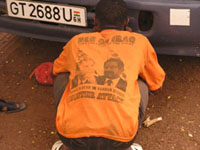
Every year sports merchandise companies print super bowl champion tshirts before the game is played. In other words, they print two sets of shirts, so that regardless of who wins, the shirts are ready to sell instantly. These companies have determined that the profit made from instantly available shirts outweighs the cost of printing a set of shirts that will be worthless once the game’s over.
So where do all the “Pittsburgh Steelers Super Bowl Champions” t-shirts go? Developing world countries.
The NFL works with World Vision, an enormous Christian humanitarian organization, to donate 100,000 t-shirts to people in developing world countries.
This is upsetting on two levels.
1. I am from Cleveland and I hate the Steelers. I am thrilled they lost, but I am not happy about the fact that someone in Zambia may be wearing a shirt that says they won.
2. (and this is the more legit reason) It’s bad aid.
It’s bad aid for a number of reasons. Laura Seay, from the excellent blog Texas in Africa sums it up well:
- We know this is bad aid. We know that [gifts-in-kind] (GIK) gifts of items (like clothing) that are readily available in a country undermine local clothing markets, create dependence, and deprive poor people of work and the dignity work provides.
- We know this is unnecessary aid. There aren’t any places in the world where t-shirts are not available at a market price determined by the local economy and affordable to local consumers.
- Both the NFL and World Vision get to claim benefits (the NFL for taxes, World Vision for its bottom line), look good in the public relations arena, and don’t owe anyone an explanation of whether the t-shirts actually do anyone any good.
- There is an opportunity cost associated with shipping 100,000 t-shirts to communities that don’t need them and that have other serious development needs.
You can read more on her blog, where she has explored this issue in depth.
It is a widely held assumption that donating used goods to a developing world country is an automatic point in the alleviating poverty column. But this is often not the case. World Vision has been running this annual donation for 16 years with little scrutiny. No longer. Increased criticism from the Internet and beyond may have World Vision reconsidering this program.
Additional reading on the subject can be found on Aid Watch.

